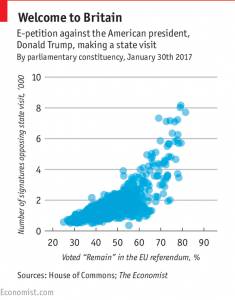Well, well. Looks like the Silicon Valley crowd are having to wise up about the threat of Trump to their interests. The New York Times claims in a headline that “Silicon Valley’s Ambivalence Toward Trump Turns to Anger”.
On Friday morning, Silicon Valley was largely ambivalent about President Trump. The software programmers, marketing experts and chief executives might not have voted for him, but they were hopeful about finding common ground with the new administration.
By Saturday night, much of that optimism had yielded to anger and determination.
Mr. Trump’s executive order late on Friday temporarily blocked all refugees while also denying entry to citizens of Iran, Iraq and five other predominantly Muslim countries. The directives struck at the heart of Silicon Valley’s cherished values, its fabled history and, not least, its embrace-the-world approach to customers. Two worldviews collided: the mantra of globalization that underpins the advance of technology and the nationalistic agenda of the new administration.
In response, a significant part of the tech community went to the barricades.
All of which is good news. But what’s this? Another piece in the same issue with the headline “Google, in Post-Obama Era, Aggressively Woos Republicans”.
Few companies have been as intimately tied to the Democratic Party in recent years as Google. So now that Donald J. Trump is president, the giant company, in Silicon Valley parlance, is having to pivot.
The shift was evident a day after Congress began its new session this month. That evening, about 70 lawmakers, a majority of them Republicans, were feted at the stately Smithsonian Arts and Industries Building, where they clinked champagne and bourbon glasses and posed for selfies with the 600 guests assembled in their honor.
The event’s main host was not from the Republican establishment. Instead, the party was primarily financed and anchored by Google.
“We’ve partnered with Google on events before, but nothing like this party,” said Alex Skatell, founder of The Independent Journal Review, a news start-up with a right-leaning millennial audience, which also helped host the event. “I’ve never heard of an event as big.”
The chief schmoozer, naturally, is none other than Google’s Executive Chairmam, Eric Schmidt. He’s decided that the thing to do is to adopt the Theresa May strategy — cozy up to the monster in the hope that he won’t be nasty to you.
What’s astonishing in both pieces is now naive the Silicon Valley crowd are about power. What they’ve been trying to do is what is technically called appeasement. Britain tried it with Hitler in the 1930s. And guess what?
So here’s a helpful suggestion for them. Print out Winston Churchill’s famous definition of appeasement as “Being nice to a crocodile in the hope that he will eat you last” in 95-point Helvetica Bold and hang it over your desk.


